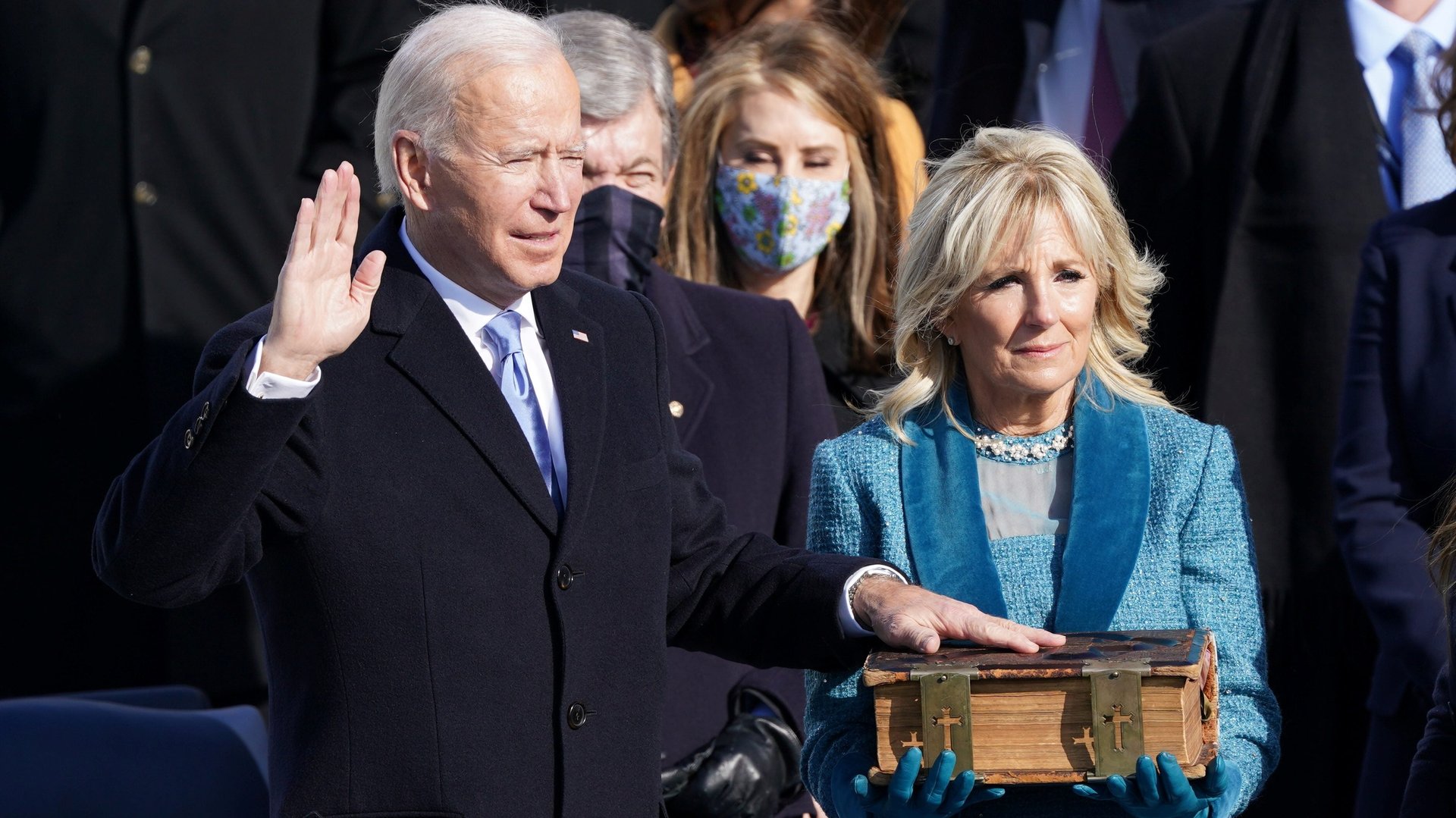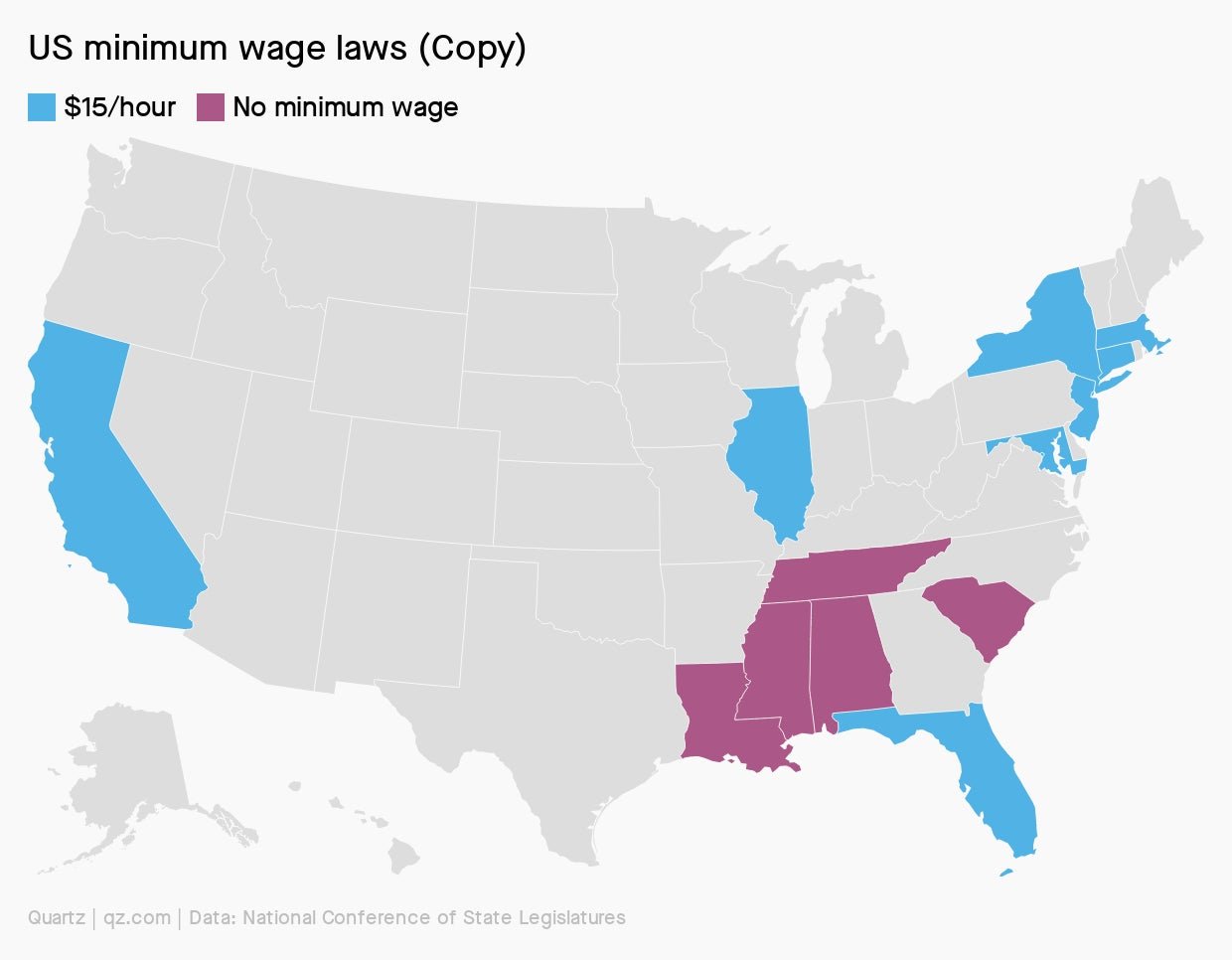Biden’s damage control, hopeful markets, new dragon fruit
Good morning, Quartz readers!


Good morning, Quartz readers!
Here’s what you need to know
Joe Biden became the 46th US president. The Capitol steps ceremony may have been unusually sparse due to the pandemic, but it was a peaceful one—a far cry from the chaos at the same setting two weeks earlier.
Now, he has work to do. Biden has an ambitious climate plan to unravel the damage done by the previous administration. Likewise, his Covid-19 response relies heavily on science in an effort to turn the country’s pandemic recovery around.
Investors sent stocks soaring. Buoyed by hopes of more federal spending and a stronger pandemic effort, the Nasdaq and S&P 500 made bigger gains than on any inauguration since 1937.
China put sanctions on members of the Donald Trump administration. After the US officially called the treatment of China’s Uyghur Muslim minority a genocide, Beijing sanctioned 28 Americans, including former secretary of state Mike Pompeo, for violating “China’s sovereignty.”
Alexei Navalny needled Vladimir Putin from prison. The Russian opposition leader released a video from jail that made direct allegations regarding the president’s corruption and abuses of power.
United Airlines has yet to find clear skies.The airline’s revenue dropped 69% and announced major operating cost cuts as the pandemic continues to wreak havoc on air travel.
What to watch for
Intel is set to post its Q4 earnings today. With a new CEO and a new or revised strategy to come, Intel, which has stopped making political contributions, is one of a growing number of major companies cribbing from IBM.
IBM doesn’t donate to political parties, candidates, or causes. Ever.
If you’ve got a US portfolio or retirement account, you’re probably invested in a number of different S&P 500 firms. Unlike IBM, many if not most of these corporations have established themselves as big contributors to individual candidates. In light of the violence at the US Capitol and some members of Congress voting against certifying the presidential election results on Jan. 6, many of these companies have announced changes of heart. While it’s still illegal to contribute directly to federal campaigns, political action committees, or PACs, have long been recipients of major Wall Street donor dollars.
Now, 37 companies, which comprise 16.9% of the S&P’s total value, have stopped contributions to representatives who backed now-former President Donald Trump’s evidence-free effort to overturn the election. Another 95 companies worth 19% of the index’s total value have stopped political contributions altogether. IBM and Intel could soon find themselves among crowded ranks.
Charting Biden and the fight for $15 minimum wage
The newly inaugurated president’s $1.9 trillion economic aid package includes a measure that would double the national average minimum wage to $15 an hour. In an early test of his commitment to building a coalition across the aisle, Biden’s gambit has been quelled by Republican lawmakers in the past. Still, success in Florida and the looming specter of Covid-19 over the labor market have given him cause for optimism.

With $15 an hour the standard in New York, California, Massachusetts, Michigan, and Florida, 40% of the US labor force now lives under what would be Biden’s minimum mark. After decades of debate, Republican obstinance, and research, it seems the US could finally be on the verge of what respected minds like the late Alan Krueger have insisted would have a negligible impact on employment while raising quality of life, despite questions around its efficacy in reducing income inequality.
Hong Kong’s freedom fighters were watching US riots
The contradiction at the heart of many Hong Kong democracy activists’ support for Trump, an ardent China critic who one such activist believed was “the lesser of two evils,” has come to the fore.
Hong Kong’s activists are fighting against, as they see it, the Chinese Communist Party’s authoritarian rule. Rioters in the US were acting on behalf of a leader with authoritarian tendencies. How does a movement fighting for democracy square its support for a leader who’s actively trying to dismantle it? How does a movement resisting authoritarian rule justify advocating for a political figure with deeply authoritarian instincts?
With its sophisticated fundraising, savvy advertising, and digital partnerships across the globe, Hong Kong’s protest has helped elevate the issue to the top of countries’ foreign policy agendas, and scored victories like US legislation supporting Hong Kong and a path to UK citizenship for millions of Hong Kongers. Still, as Trump retreats into a world replete with financial and legal trials ahead, many among Hong Kong’s protest movement worry their alignment with the US election’s losing side may belie a rift within the movement and a larger misunderstanding of American politics.
✦ Enjoying Quartz and want to more directly support quality journalism? Try a membership free for seven days.
Surprising discoveries
Your cast iron pan needs soap. Conventional wisdom says it’ll ruin the finish, but conventional wisdom has been lying to you.
Dragon fruit’s proposed new name isn’t going over well. The Indian state of Gujarat says the name “Kamalam” is in reference to the fruit’s lotus-like appearance and is not a political move.
Inappropriate cakes got an Egyptian baker arrested. Police tracked her down after pictures of happy customers went viral.
Coughing is no joke. An annoyed Vancouver couple coughed on equipment to scare their fellow gym-goers and got fined.
Productivity can’t be hacked. Instead, build a healthy, sustainable productivity system. Sign up for our five-day email course to learn how to increase your personal productivity at work.
Our best wishes for a productive day. Please send any news, comments, alternative fruit names, and NSFW confections to [email protected]. Get the most out of Quartz by downloading our iOS app and becoming a member. Today’s Daily Brief was brought to you by David Yanofsky, Michelle Cheng, Mary Hui, Jordan Lebeau, and Susan Howson.